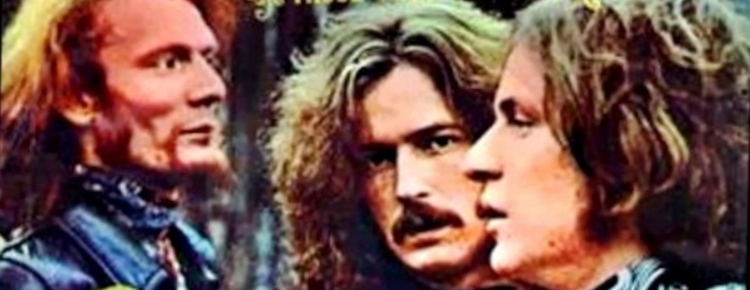
Percussion master Ginger Baker has died. The drummer, best known for his work with the hugely influential trio Cream, was 80.
“We are very sad to say that Ginger has passed away peacefully,” his family said Oct. 6.
Baker co-founded Cream in 1966 with guitarist Eric Clapton and bassist-singer Jack Bruce. The London-based group played an aggressive form of blues rock with touches of psychedelia; it was known for extended live improvisations.
The band’s many key tracks include “Sunshine of Your Love,” “White Room,” “Badge,” “Tales of Brave Ulysses,” and “I’m So Glad.”
Baker’s spotlight piece “Toad” ushered in the hard-rock custom of extended drum soloing, although few if any of Baker’s contemporaries could match the drummer in terms of precision or of entertainment value. The track first appeared on Cream’s debut LP, then returned in an extended live version on “Wheels of Fire.”
Baker was one of the first rock drummers to adopt the double bass drum kit, inspired by Sam Woodyard of Duke Ellington’s band. Baker was a fluid and deliberate drummer, intent on stealth and sway.
Baker also proved a handy songwriter for Cream, contributing the moody numbers “Sweet Wine,” “Passing the Time,” “Those Were the Days,” “Blue Condition” and the droll comic piece “Pressed Rat and Warthog,” which he narrated, to fans’ delight.
Cream released four albums in its two-year lifetime before saying goodbye with a dramatic stand at London’s Royal Albert Hall. The threesome re-formed for a handful of 2005 performances that were largely financially driven, yet were well received. The reunions in London and New York weren’t repeated, reportedly due to (the inevitable) backstage drama among the musicians. (Jack Bruce died in 2014. Baker hailed him as “a fine gentleman.”)

Bruce and Baker came to the group with a history of interpersonal troubles, having played together in the Graham Bond Organisation. There were reports of onstage fistfights and even knife play. Clapton reportedly insisted on Bruce joining the trio project, much to Baker’s dismay. (The Bruce-Baker animosity continued over the decades.) The group was called Cream due to its members being “the cream of the crop” in the London blues-rock scene — and was considered the first rock “supergroup,” even though only Clapton was famous at the time.
Baker repeatedly referred to Cream as a jazz act that was accompanied by a blues guitarist. “I don’t think Cream was a rock ‘n’ roll band by any stretch of the imagination,” he told the San Diego Union in 1988. He said he hated performing in the trio due to its “incredibly loud” sound.
In 1969, Baker joined Clapton in another supergroup, Blind Faith, with Stevie Winwood on keyboards and vocals. They released only one album before breaking up. Baker’s “Do What You Like” jam took up most of its second side. The album is considered a rock classic. Baker’s drug use reportedly was a contributor to the group’s aborted run.
The next year, Baker formed the global-music big band Ginger Baker’s Air Force, which was fueled by the drummer’s fascination with African rhythms. Winwood played and sang in the original version of that collective. It was briefly revived in 2016, before Baker’s health problems doomed a planned tour. While little-known, the original group has been credited with being first to bring African influences into the rock arena.
Other Baker-affiliated groups included the metal act Masters of Reality, the Ginger Baker Trio, Hawkwind, the Baker Gurvitz Army and Jazz Confusion. He also played with Public Image Ltd. and again with Bruce in the short-lived BBM (Bruce, Baker, Gary Moore).
Although Baker found fame as a rock musician, most of his work in recent decades could be best described as jazz or world music.
“What you get is essentially African cross-rhythms through the filter of a pianoless jazz group” or vice versa,” the New York Times noted in its review of a 2013 Jazz Confusion show in Manhattan.
Baker lived in Africa for an extended period, working with Fela Kuti and many other regional musicians. He operated a recording studio in Lagos, Nigeria, and a polo ranch in South Africa. He also settled in Colorado and rural Italy.
His solo albums included “Stratavarious,” “Horses & Trees” and “Why?”
The indie-film documentary “Beware of Mr. Baker” emerged in 2012, its title reflecting the drummer’s often belligerent nature. In one scene, he assaults the film’s director.
Upon hearing of Baker’s death, Bruce’s family said: “Surviving a love-hate relationship, Ginger was like an older brother to Jack. Their chemistry was truly spectacular.”
Bandmate Winwood said: “Beneath his somewhat abrasive exterior, there was a very sensitive human being with a heart of gold. He’ll be missed.”
Baker’s passions included horses, polo and heroin.
In 2016, Baker retired from performing, saying he had a heart issue. His family announced late last month that he was in hospital and in critical condition.
Peter Edward “Ginger” Baker was born Aug. 19, 1939, in London. He died Oct. 6, 2019, in Canterbury, England.
RIP Ginger Baker, it makes me sad knowing you will not be around anymore to play you beautiful music. You will be greatly missed. My love and condolences to the family and children of Ginger Baker. From this day forward Cream will only be in our hearts and way back memories. Those Were The Days.
Easily one of the greatest musicians to emerge from the UK in the 1960s, he went on to create a resume that would be the envy of any serious player. I’ll forgive Baker for all of the horrors that ‘Toad’ unleashed and remember instead things like the fill towards the end of ‘White Room’ as well as his deep and abiding love for African music. In ‘Beware of Mr Baker’, he movingly described musicians like Elvin Jones, Max Roach, and Art Blakely as ‘friends’. To my mind, he can take his place among them as their equal. ‘Those Were the Days’, indeed. RIP Ginger Baker